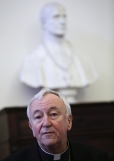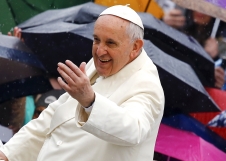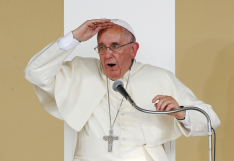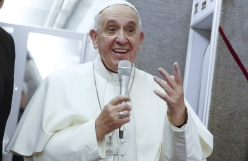"Who am I to judge?" Pope Francis famously answered, early in his pontificate, when talking to journalists about gay people on a flight back from Brazil. But the truth is that in the next three weeks, like it or not, he must make some of the most difficult judgements of his 78 years.
The troubling anomalies of the pope's position have been thrown into relief by the affair of 43-year-old priest, Krysztof Charamsa. He was dismissed yesterday from the Congregation for the Doctrine of the Faith for his public coming out after he announced that he was in a gay relationship, denounced the "current atmosphere of exasperating homophobia" and said the Church's demand that gay believers live a life of "total abstinence from a life of love" is inhuman.
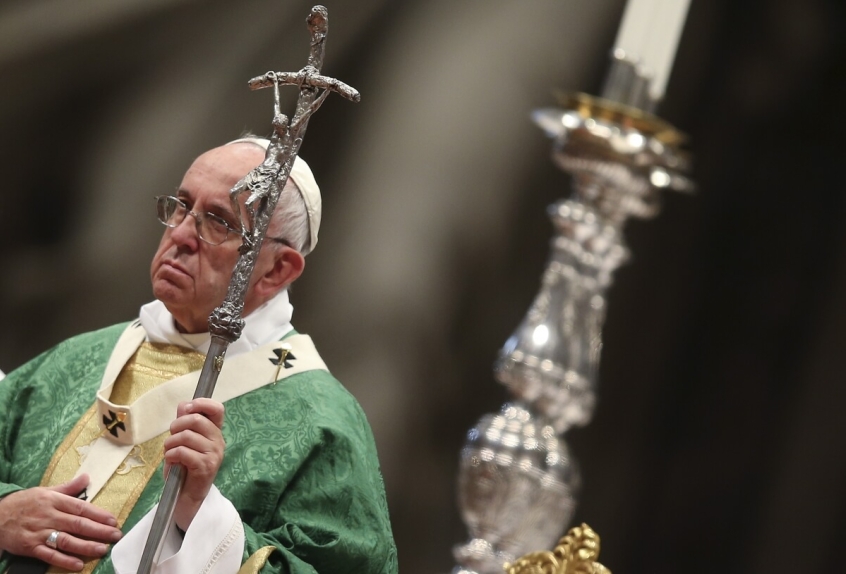
Father Charamsa had served on the CDF since 2003. This was the body that in 1986, under the leadership of the future pope, then Cardinal Joseph Ratzinger, issued a letter to bishops on the pastoral care of homsexual people. This letter makes it clear that the Church sees orientation itself, not just homosexual acts, disordered.
Ratzinger's letter says: "Although the particular inclination of the homosexual person is not a sin, it is a more or less strong tendency ordered toward an intrinsic moral evil; and thus the inclination itself must be seen as an objective disorder."
Whether or not Pope Francis cares to judge, this is his Church's position. Father Charamsa and the thousands of priests and hundreds of thousands of laity like him worldwide are damned if they do, damned if they don't, in the eyes of their Church.

But the problems facing the Catholic Church go far deeper than this issue.
Many find it simply staggering to hear celibate male clerics justify the rule on admission to communion following divorce and remarriage. The effect of this rule means that a multiple murderer who has been to confession, a tax evader and serial adulterer who receive absolution, can receive communion. However, a woman deserted by her husband for a younger model, who finds a new love willing to support her and her children and marries him, cannot.
Instead, having committed no crime, she has to sit like a pariah in her parish church while others - liars, thieves, paedophiles and worse - can receive communion. She can of course obtain an annulment, a process made easier now by the pope. But perhaps she feels insulted by this, feels that in her own and God's eyes her first marriage was real, and that her children deserve to feel themselves the product of a true marriage.
It is surely unimaginable that Jesus would ever have given his blessing to this cruel and unjust rule.
Then there is the issue of artifical contraception. This vital tool in the fight against HIV/AIDS is still banned by the Church because every act of love must be open to the possibility of life. This is an admirable ideal in many respects and the encyclical that expounded it is a beautiful read. But it is completely impractical, and has little or no bearing on modern lives, which is why many if not most Catholics now ignore it. It makes the Church look ridiculous at a time when the world needs it to be strong.
On top of all this, there is clerical celibacy. Charamsa would have been dismissed had he been heterosexual because he has broken his vow of chastity. Most Catholic priests embrace a life of abstinence from sexual love. The difference for gay Catholics is that even those who are not called to celibacy are told by the Church they must be celibate. That is what Father Charamsa was driving at.
And then there is women's ordination. In the US, wherever the Pope went, there were processions of beautifully vested men. This looks anomalous in a western world where such discrimination is increasingly unacceptable, particularly in the eyes of the young.
In his opening homily to the Synod, Pope Francis emphasised heterosexual love: "This is God's dream for his beloved creation: to see it fulfilled in the loving union between a man and a woman, rejoicing in their shared journey, fruitful in their mutual gift of self," he said. He spoke of the "true meaning of the couple and of human sexuality" in God's plan.
Nice words, signifying little. The next three weeks will see a fierce battle between conservatives who will fight every new dot and comma, and liberals who want a new language, but lack the means to bring it about.
With some of the things he says and does, Pope Francis gives every impression of inward movement on some of these intractable issues. He is conservative on both doctrine and the Church's social teaching. Ultimately he will kneel and pray by the rules of the institution he serves. Even were he to want change, it will prove impossible for him to effect it in any of these areas, certainly at this Synod on the Family and in the subsequent document. The only way would be to go a big step further and call a Third Vatican Council. It is not change that will be fought so much in the next three weeks, as the possibility of change in the future. Pope Francis finds himself in a fascinating situation. His only solution can be to let go, ask the questions, and let God take care of the answers,.










